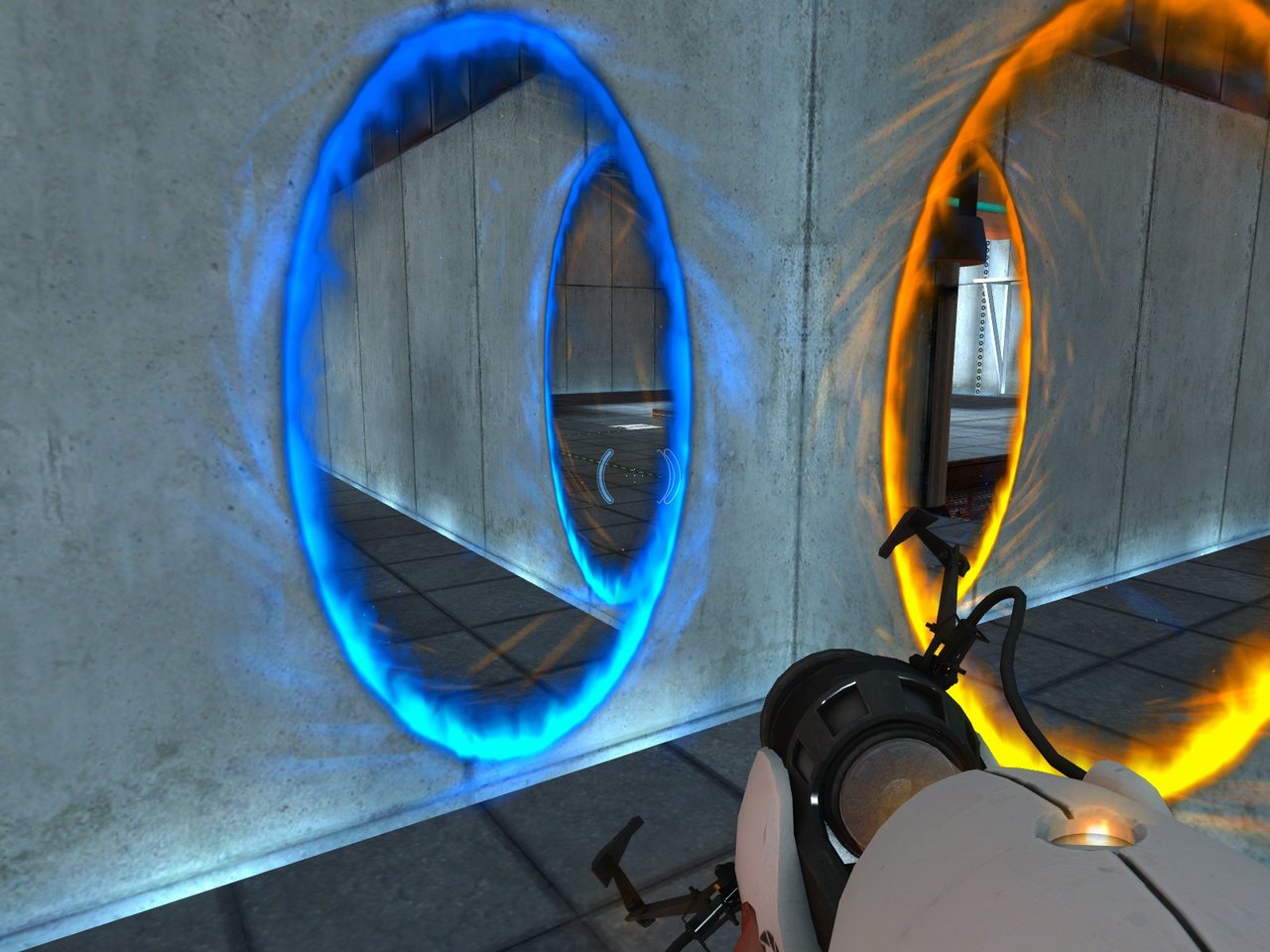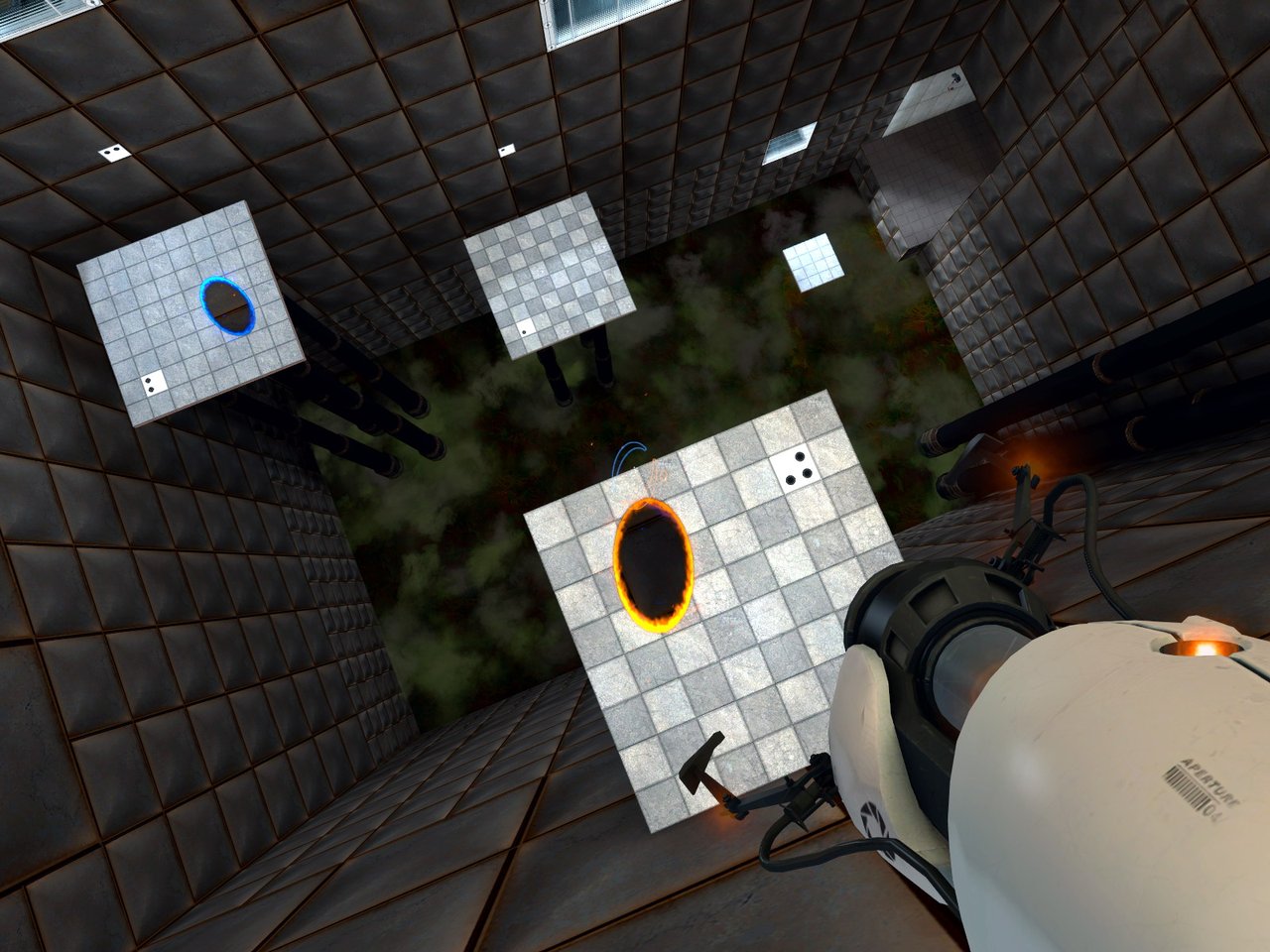When Portal was originally released as part of The Orange Box in October of last year, its uniquely puzzling gameplay and dark, sharp-witted humor thrilled consumers and critics alike. Set in a mysterious scientific facility, Portal introduced players to new ways of moving through the gameworld that challenged their perspective and flexed their spatial awareness. The pitch-perfect voice-over soon became stuff of Internet legend, and the song that played during the end credits was so popular that it has since been released as a downloadable track for Rock Band. The only real complaint that surfaced was that the game ended too quickly. Recently released as a stand-alone retail product, Portal remains a unique gem of a game that packs a huge amount of appeal into a small package.
At the outset of Portal, you wake up in a sleeping pod. Rising to the tinny sound of Muzak playing on a radio, you look around your glass-walled cell and notice that there is no door. A sedate, quasi-robotic voice welcomes you to your "relaxation vault," mentions something about "enrichment center activities," and alerts you that a portal will be opening shortly. A moment later, a tall, orange-rimmed oval appears on the wall next you. Looking through the glass to the hallway outside your cell, you notice a similar, blue-rimmed oval. Inside the blue oval stands a woman in an orange jumpsuit who appears to be mimicking your every move. Then you realize that the woman is you, and that you are looking at yourself in profile. Stepping through the oval, you find yourself in the hallway outside of the relaxation vault, looking in at where you stood just a moment ago. You've just had your first taste of portals, and it's only going to get weirder from here on out.

The first few levels of Portal introduce you to fairly simple applications of portal technology, eventually putting the portal gun in your hands and enabling you to create portals anywhere you like. Well, not quite anywhere. Certain surfaces are not portal-able, and this is one way that subsequent levels, known as test chambers, become more difficult. Other elements, such as energy balls, weighted cubes, floor switches, and moving platforms, are incorporated into the test chambers in increasingly exacting ways, but the real complexity and the real genius of Portal lie in the challenge of "thinking in portals."
Sure, you know that if you place portals here and there, you will enter here and exit there, but what if here is the floor 20 feet below you and there is a spot high up on the wall? You'll retain your momentum while going through the portal, so entering the floor portal at speed will rocket you out of the wall portal perpendicular to the floor. This has a profound impact on your strategy, but not all portal-thinking is strategic. If you place one portal at your feet and the other on the ceiling overheard, will you fall forever? Or if you put two portals on the floor side by side, could you create a reasonable facsimile of whack-a-mole? The magic of Portal is that it truly does inspire this unique flavor of spatial imagination, and once you get a taste, you'll be delighted to find yourself thinking in portals even when you're not in front of your PC.
If portal technology is the meat of the game, then GLaDOS is the perfectly paired wine. The omnipresent voice that guides you through the test chambers, GLaDOS initially reveals a dry, almost unintentional sense of humor in the first few test chambers. As you progress, her humor begins to show signs of self-awareness, eventually blossoming into something too hilarious and too well-deployed to spoil here. Suffice it to say, it is one of the chief pleasures of Portal and features some of the best writing in video game history.

For all its heady delights, Portal is a short-lived feast and can be reasonably completed in as little as five hours. To help draw things out a bit, Valve has included six advanced chambers, all of which are existing test chambers tweaked to present a tougher challenge. You can also take on challenge maps and attempt to complete the test chambers with the least number of portals, the least steps, or in the least time. Ever since it was originally released more than six months ago, there has been ample time for the online community to produce a bevy of maps that, though varying in quality, are freely available for any test-chamber-hungry portaler to download. Its Orange Box roots mean that Portal also comes equipped with in-game achievements that can serve to extend its longevity. Nevertheless, the odds are that it'll be over a bit too quickly for your liking.
Short as it may be, Portal is a fantastic game that should be played by anyone interested in unique, well-crafted gameplay and a witty, whip-smart script. The stand-alone retail release comes with the same price point as the downloadable Steam release, which is about the cost of a night out at the movies. Portal may not last much longer than some feature films, but pound for pound it remains one of the best games on store shelves.